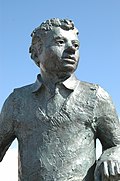
A | B | C | D | E | F | G | H | CH | I | J | K | L | M | N | O | P | Q | R | S | T | U | V | W | X | Y | Z | 0 | 1 | 2 | 3 | 4 | 5 | 6 | 7 | 8 | 9
Welcome to the Poetry Portal


Poetry (from the Greek word poiesis, "making") is a form of literary art that uses aesthetic and often rhythmic qualities of language to evoke meanings in addition to, or in place of, literal or surface-level meanings. Any particular instance of poetry is called a poem and is written by a poet. Poets use a variety of techniques called poetic devices, such as assonance, alliteration, euphony and cacophony, onomatopoeia, rhythm (via metre), and sound symbolism, to produce musical or incantatory effects. Most poems are formatted in verse: a series or stack of lines on a page, which follow a rhythmic or other deliberate pattern. For this reason, verse has also become a synonym (a metonym) for poetry.
Poetry has a long and varied history, evolving differentially across the globe. It dates back at least to prehistoric times with hunting poetry in Africa and to panegyric and elegiac court poetry of the empires of the Nile, Niger, and Volta River valleys. Some of the earliest written poetry in Africa occurs among the Pyramid Texts written during the 25th century BCE. The earliest surviving Western Asian epic poem, the Epic of Gilgamesh, was written in the Sumerian language.
Early poems in the Eurasian continent evolved from folk songs such as the Chinese Shijing as well as from religious hymns (the Sanskrit Rigveda, the Zoroastrian Gathas, the Hurrian songs, and the Hebrew Psalms); or from a need to retell oral epics, as with the Egyptian Story of Sinuhe, Indian epic poetry, and the Homeric epics, the Iliad and the Odyssey. (Full article...)
Selected article

Haiku (俳句, listen) is a type of short form poetry that originated in Japan. Traditional Japanese haiku consist of three phrases composed of 17 phonetic units (called on in Japanese, which are similar to syllables) in a 5, 7, 5 pattern; that include a kireji, or "cutting word"; and a kigo, or seasonal reference. However, haiku by classical Japanese poets, such as Matsuo Bashō, also deviate from the 17-on pattern and sometimes do not contain a kireji. Similar poems that do not adhere to these rules are generally classified as senryū.
Haiku originated as an opening part of a larger Japanese genre of poetry called renga. These haiku written as an opening stanza were known as hokku and over time they began to be written as stand-alone poems. Haiku was given its current name by the Japanese writer Masaoka Shiki at the end of the 19th century.
Originally from Japan, haiku today are written by authors worldwide. Haiku in English and haiku in other languages have different styles and traditions while still incorporating aspects of the traditional haiku form. Non-Japanese language haiku vary widely on how closely they follow traditional elements. Additionally, a minority movement within modern Japanese haiku (現代俳句, gendai-haiku), supported by Ogiwara Seisensui and his disciples, has varied from the tradition of 17 on as well as taking nature as their subject. (Full article...)
Selected image

Poetry WikiProject

Selected biography

Although Thomas was appreciated as a popular poet in his lifetime, he found earning a living as a writer difficult, which resulted in his augmenting his income with reading tours and broadcasts. His radio recordings for the BBC during the latter half of the 1940s brought him to the public's attention and he was used by the Corporation as a populist voice of the literary scene. In the 1950s, Thomas travelled to America, where his readings brought him a level of fame, though his erratic behaviour and drinking worsened. His time in America cemented Thomas' legend, where he recorded to vinyl works such as A Child's Christmas in Wales. (Full article...)
Did you know (auto-generated) -

- ... that Ludwig Ferdinand Huber wrote the text for a book with humorous illustrations by poet Friedrich Schiller?
- ... that Rabia Balkhi is the first known Persian woman poet?
- ... that known books bound in human skin include a highwayman's memoirs bound in his own skin, a novel about a man being left by his lesbian wife, and a BDSM erotic poem?
- ... that Minnesang poet Walther von Klingen is depicted jousting in the Codex Manesse manuscript?
- ... that Jan Kochanowski's Fraszki is a 16th-century collection of almost 300 poems, ranging from anecdotes and epitaphs to obscenities and erotica?
- ... that Matei Donici, a general in the Imperial Russian Army, secretly wrote poetry with Romanian-nationalist and anti-Russian messages?
Selected poem
| A Mountain Home by Heinrich Heine |
|---|
|
On the mountain stands the shieling, |
